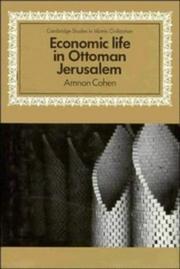| Listing 1 - 1 of 1 |
Sort by
|

ISBN: 0521365511 0521524350 0511523963 9780521365512 9780511523960 9780521524353 Year: 2002 Publisher: Cambridge Cambridge University Press
Abstract | Keywords | Export | Availability | Bookmark
 Loading...
Loading...Choose an application
- Reference Manager
- EndNote
- RefWorks (Direct export to RefWorks)
Jerusalem was never just another Ottoman town, but in the heyday of the Ottoman Empire it displayed many of the characteristics of a Muslim traditional society. Professor Cohen makes full use of the rich and hitherto unexplored Arabic and Turkish archives relating to this period to reconstruct a vivid and detailed picture of everyday life in this lively urban centre. His study focuses on the major guilds of sixteenth-century Jerusalem - butchers, soap-producers and dealers, millers and bakers, describing and analysing their production methods, prices and measures, and the services they provided for the local population. In addition, their economic ties with neighbouring villages, as well as their social background and inter-relations are discussed. The author shows how this detailed knowledge can lead to a better understanding of the longer-term changes in the economy of the city and of the Empire as a whole.
History of Asia --- anno 1500-1599 --- Jerusalem --- Meat industry and trade --- Soap trade --- Bread industry --- -Meat industry and trade --- -Soap trade --- -Cleaning compounds industry --- Meat consumption --- Packing industry --- Baked products industry --- -Jerusalem --- -Meat consumption --- Cleaning compounds industry --- Food industry and trade --- History --- Ierusalim --- Yerushalayim --- Jeruzalem --- Quds --- Ūrushalīm --- Kuds --- Kouds --- Erusaghēm --- Bayt al-Maqdis --- Jeruzsálem --- Jerusalem (Israel) --- Jerusalem (Palestine) --- ʻIriyat Yerushalayim --- Ierousalēm --- Gerusalemme --- Baladīyat al-Quds --- Baladīyat al-Quds al-ʻArabīyah --- Jerusalem Arab Municipality --- Qods (Jerusalem) --- ירושלים --- القدس --- al-Quds --- قدس --- Economic conditions. --- History. --- Иерусалим --- Jerusalén --- Arts and Humanities --- Meat industry and trade - Jerusalem - History - 16th century. --- Soap trade - Jerusalem - History - 16th century. --- Bread industry - Jerusalem - History - 16th century.
| Listing 1 - 1 of 1 |
Sort by
|

 Search
Search Feedback
Feedback About UniCat
About UniCat  Help
Help News
News